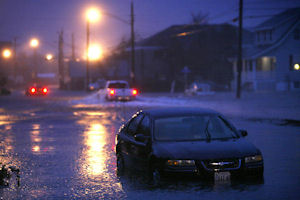About Bacon’s Rebellion
Bacon's Rebellion is Virginia's leading independent portal for news, opinions and analysis about state, regional and local public policy. Read more about us here.
A Rising Tide Raises... Questions. Lots of Questions.

A new William & Mary Law School clinic will address prickly legal and policy questions arising from endemic flooding in Virginia's vulnerable Tidewater lowlands.
by James A. Bacon
No one knoww fast the sea level off Virginia's coast will rise by the end of the century. It could be more than a foot, if the trend of the last century prevails. It could be closer to three feet, if some of the more pessismistic warnings come true. Whatever the future portends, almost everyone agrees that storm surges and high tides are inundating more of Virginia's low-lying land than in the past. Hampton Roads -- after New Orleans, the metropolitan region in the United States with the lowest elevation -- is at tremendous risk, even if the more ominous predictions are decades away.
Rising sea levels -- or, if you find that phrase too ideologically loaded, recurrent flooding -- confronts Virginia with a host of engineering, political and legal questions that few Americans have given thought to. As Wetlands Watch Executive Director Skip Stiles puts it, most law and public policy assumes a static coastline. "Our law doesn't deal with a shoreline that moves."
Shana Jones, director of the newly created Virginia Coastal Policy Clinic, hopes to help the commonwealth grapple with a wide range of policy and legal issues relating to the increase in inundations. Working with the Virginia Institute of Marine Science (VIMS) and Old Dominion to gather relevant scientific and technical information, the clinic has the goal of providing lawmakers "the best information we can."
Lawmakers need help, for questions abound. What options do local governments around Hampton Roads and the Chesapeake Bay have to cope with the rising tide? How much will it cost to harden the coastline? What changes should localities make to building codes, zoning codes and comprehensive plans? What role should the state play in regulating flood insurance -- and to what effect? What rights do property owners have to build in flood-prone zones that governments cannot economically serve? "They are very thorny questions," says Jones.
Adding another layer of complexity is Virginia's state constitution. The Old Dominion is a Dillon Rule state which allows local governments only those powers expressly granted them by the General Assembly. What authority should the legislature grant local governments in harm's way? Would those newly created powers set precedents that other jurisdictions, further inland, might find obectionable?
The coastal policy clinic, based in the College of William & Mary Law School, is receiving funding from the Virginia Environmental Endowment. Executive Director Gerald McCarthy describes it as one of the most exciting and potentially significant programs he has underwritten in three-and-a-half decades of running the endowment.
The sea level has been inching higher since Virginians first began measuring it in the 1920s. Although the rise has been slow, little more than an inch a decade, it adds up over the generations. "People think of sea-level rise as like sitting in a slowly rising bathtub," says Jones. "The problem comes when we get a nor'easter, a full moon or a hurricane. It's the surge that is problematic."
The surges are getting worse -- even as coastal development has continued largely unimpeded over the years. Insurance companies, whose job it is to appraise risk, have concluded that the risks are getting worse. Allstate, USAA, Mutual of Virginia and other insurers have either withdrawn or modified their policies along the shoreline, says Stiles. "State Farm won't write a policy within two miles of the coast. We're seeing a lot of that. There will be pressure to pool and subsidize risks."
As insurance gets more expensive and more restrictive, coastal landowners are likely to petition for relief. "Will the state step in, as it has in other states?" asks Stiles. One policy alternative would be to pool risks with inland Virginians who are unlikely to experience tidal flooding. By transferring costs from coastal dwellers to inland dwellers, however, such a policy would effectively subsidize building in risky, flood-prone areas. Is that wise? But if coastal dwellers are left on their own, what options might they have to preserve their wealth? Might Virginia see the same pattern as North Carolina's Outer Banks where property owners pool investment funds, build for cash, go bareback on insurance and assume the risk themselves?
A related question is whether state and local government should restrict coastal development that requires a higher level of public investment in roads, utilities and other infrastructure. A recent study concluded that it would cost $150 million just to safeguard two Norfolk neighborhoods, Larchmont and Little Creek. Extending such protection across the region could cost billions.
Can localities use zoning and comprehensive plans to block building in flood-prone areas? Can they refuse to build and maintain infrastructure that are likely to suffer repeated damage? "Say the city decides it will no longer provide certain services in an area," conjectures Jones. "If you're a property owner, you think, 'the value of my property just went down.'" Could such a governmental decision, she asks, constitute an unconstitutional "taking"?
Endemic flooding could pit property owners versus taxpayers as property owners demand government investment to preserve their property values while taxpayers object to the shifting of costs to people who were prudent enough not to build or buy in a flood zone.
Says Stiles: "The timing of this clinic is great. It's coming along just as folks are really beginning to grapple with these issues."
=============================================
This article was made possible by a sponsorship of the Piedmont Environmental Council.

